This story is one of the runner-up stories in the 20sStreets competition. The competition invited entrants to research and share stories of the 1920s, searching for the most fascinating local history stories covered by the 1921 Census of England and Wales. There were six winning stories and twelve runners-up entries.
Memories of Market Rasen Cinema in 1923
By Caroline from Rasen – runner-up, one of ten in the Individual category
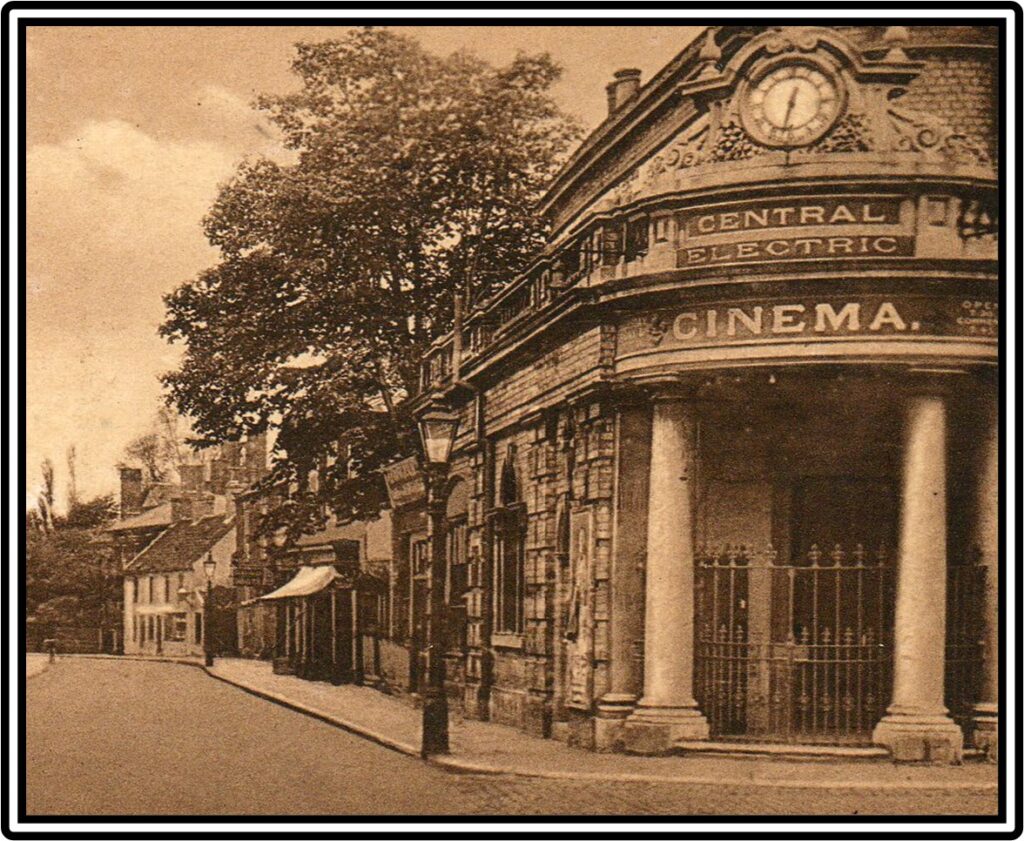
The Central Electric Cinema, Market Rasen. Image credit: Postcard in author’s collection
Market Rasen 1940
My name is Len and I work at the railway station. I have just seen off a train full of young men going to war. I am 33 yrs old and in a reserved occupation. While waiting for the next train, I started to think back to when I was that age.
1923
I was a 17 year old farm worker, living in Market Rasen. A boring market town 17 miles north of Lincoln. I worked long hours in the fields, then home for my tea and straight out to meet my friends in the Market Place. Boring! Nothing to do, ten pubs which had barred us, five chapels/churches full of women and old men having charity events, dances, services and Sunday school- nothing for me. Except the whist drives, I am good with numbers (although not good enough for the local grammar school) but I could play and win prizes for the family.
There are many sport clubs in town – football, cricket, hockey, golf and the horse racing, but I am not interested. But there was a place I liked to go to, the Central Electric Cinema. Since it reopened after the Great War, several businessmen have tried to run the cinema. In 1922 Mr J W Watson (the Proprietor of the building) took over the cinema and changed its name from The Picture House. It is warm, with fancy cushioned tip-up seats – 350 of them; live music and a different programme twice a week and all of the recent films (1919-1921), both British and USA productions. There is usually the main film, then a short comedy or sporting event and Pathe News/Gazette.
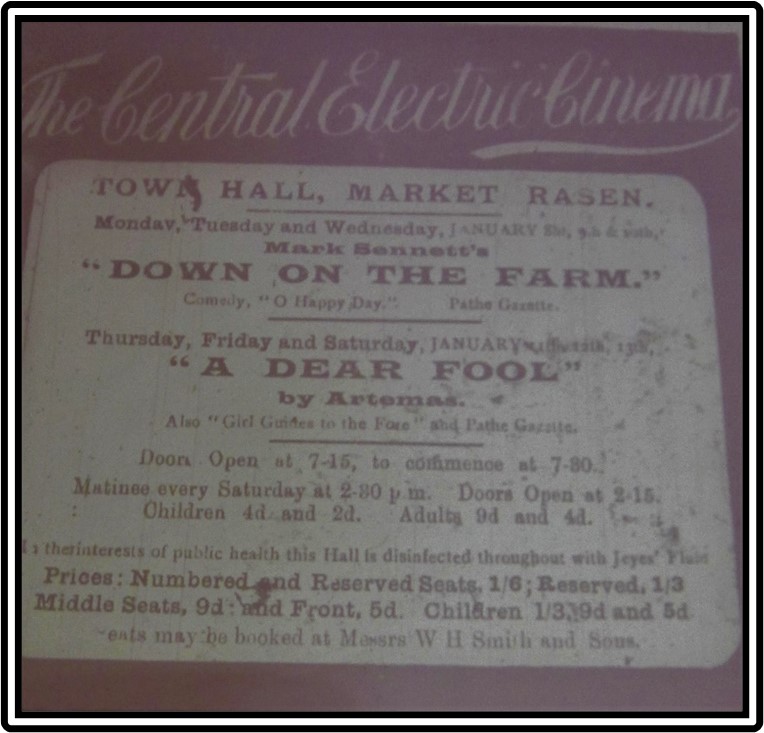
An advert for the cinema in the Market Rasen Mail. Image credit: Lincolnshire Library Collection
The movies break up the boring events of everyday life; the town was trying to recover and move on from the aftermath of the war, but the unveiling of the War Memorial last year has dragged up memories for everyone. If I had enough money, I would go to the movies twice a week, depending on who was on the door (I could get in as a child).
January 8-10th “Down on the Farm” USA 1920 and January 11-13th “A Dear Fool” British 1921.
Matinee every Saturday at 2.30pm, children 4d and 2d and Adults 9d and 4d.
In the interests of public health, the hall is disinfected throughout with Jeyes Fluid.
Prices; Numbered and Reserved seats 1/6; Reserved 1/3. Middle seats, 9d; and Front, 5d. Children 1/3, 9d and 5d. Seats booked at WH Smith and Son.
“Down on the Farm” was a 50-minute comedy on an American farm, nothing like my farm! The cinema is in the old building in the Market Place, it was built in 1850s as a Corn Exchange, then a Market Hall, Town Hall and shops.
7-9th February
The Market Rasen Amateur Operatic Society held an event for local charities in Central Electric Cinema. They performed “The Yeoman of the Guard”. I did not go but it was fun to watch the cast running across the main road in full costume. No changing rooms in the cinema, they had to relied on shopkeepers to open up for them.
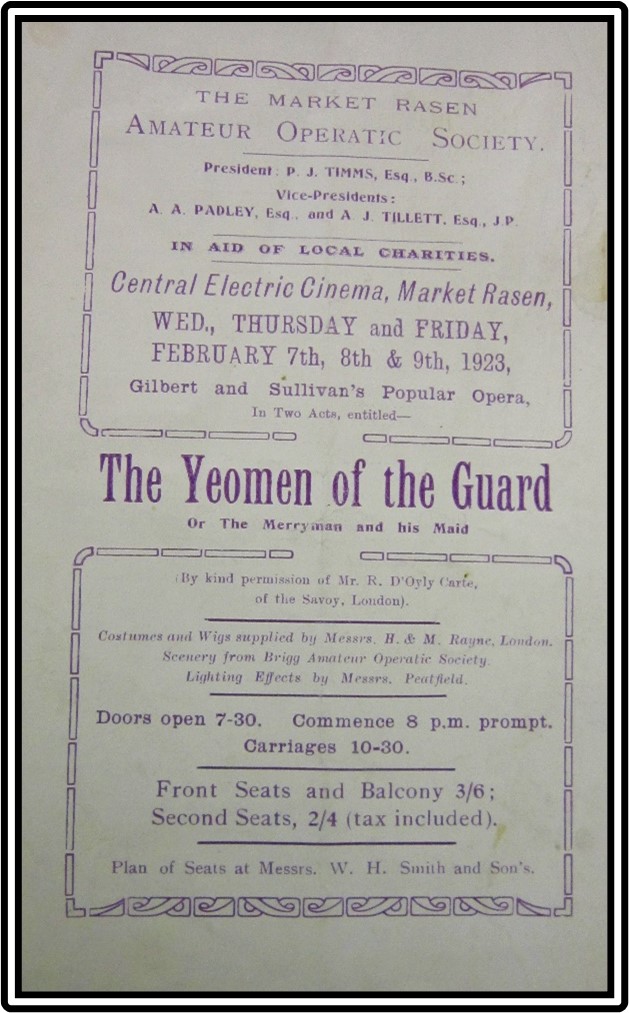
An advert for the cinema in the Market Rasen Mail. Image credit: Lincolnshire Library Collection
March
I was busy on the farm and missed several programmes but at Easter, I had a few days off.
The cinema was showing the following- 26-28th March, a Charlie Chaplin film, 29-30th “Wings of Love”, closed on Good Friday. On Easter Monday evening, a special programme “the Bargain”, a 1921 British crime film.
I went to see the Chaplin film- it was ok! I did go to the races on Easter Monday, very busy.
Easter Monday, 2nd April
The Market Rasen Mail reported that there was a record crowd at the Horse Races, in Caistor Road. There were extra trains providing transport for race enthusiasts from as far away as Leeds. The success of the meet encouraged the Market Rasen Steeplechase Committee to form a limited company. They purchased the land on the Legsby Road and on 24th April 1924 the inaugural meet took place. But gangs of jewellery thieves and pickpockets from Leeds caused problems at the Easter race meeting, a couple were arrested at the Railway Station.
Tuesday 3rd April
The local JPs attended the Petty Sessions at the Magistrates’ Court. The Fines were issued for the following offences; no control over horses; stray dogs; riding on the footpath; moving pigs without a licence; carts without lights. The JPs also appointed the Parish Constables for the year.
At the Children’s’ Court, Percy Proctor, 13 yrs, (I knew one of his brothers before he was sent to sea) was bound over for 6 months, for stealing Miss Drake’s vanity case, while she was at the pictures. P.C Rounce hid in the cinema and caught him breaking back in. P.C Rounce caught me poaching a couple of times. I am now too old for the Children’s Court and have to be careful.
5-7th April
The cinema presented “Get Your Man” featuring Buck Jones, a romance of the Canadian Mounted Police. USA 1921. Also, the TODD-LEWIS fight at the Albert Hall on 21st February.
Roland Todd aged 23, a lad from Doncaster, British and Empire Middleweight Champion. I enjoyed both films and wanted to be a Mountie or Boxer. But I do not want to be a fireman. Drama in the town – the mill burnt down.
10th April, Lammas Leas Mill
Mr Thomas Hill sold this mill to Mr John Philipson in 1922, it needed major refurbishment. The mill was built in 1868 and in its heyday had eight sails and was the talk of the area. In the evening at 8pm, a candle was blown over on the third floor and by the time the alarm had been raised it was too late to save the mill. The fire brigade in their horse-drawn engine were able to save the surrounding buildings. A total of £750 of damage was caused, and it took the steeplejack Mr J W Smith from Lincoln four days to clear the site. The sails were hanging on precariously.
Thursday 19th-Saturday 21st
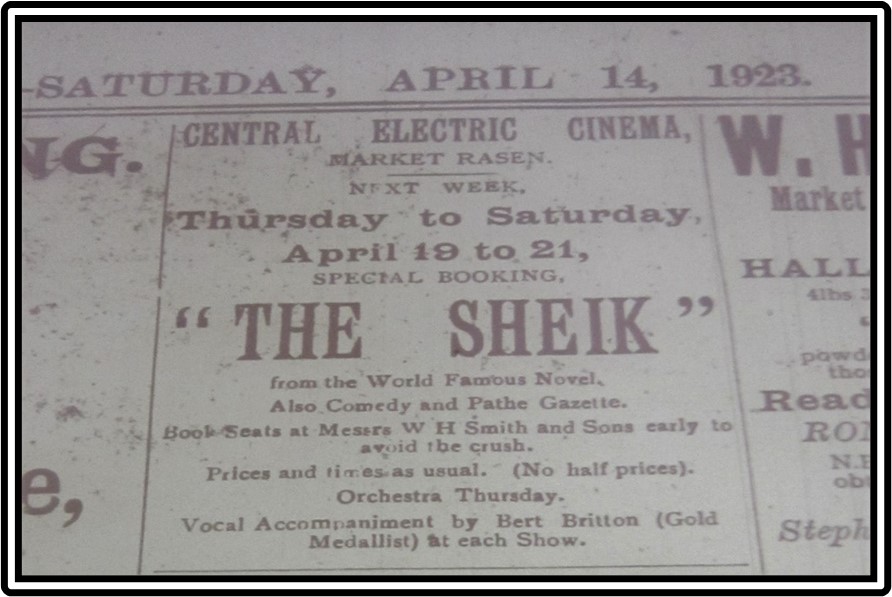
An advert for “The Sheik” at the cinema in the Market Rasen Mail. Image credit: Lincolnshire Library Collection
“The Sheik”, no half prices, only an orchestra on Thursday, but all shows to have vocal accompaniment by Mr Bert Britton. Also, a Comedy and Pathe Gazette. “The Sheik” USA 1921, 80 minutes.
I took my Mother to see Rodolph Valentino, she really enjoyed it.
Saturday 21st April
At the Market Rasen Police Court, Harry Nosler was sentenced to 6 months hard labour for receiving stolen goods. He had been arrested in Leeds for stealing Miss Flintham’s jewellery. Miss Flintham of the George Inn had had her jewellery (£40/50 in value) stolen on the night of the Easter Monday horse racing. Harry Nosler proved that he had bought them for £10 and not stolen the items.
23rd-25th April
Charlie Chaplin in “A Day’s Pleasure”. A 25-minute USA film 1919.
26th -28th April
Ethel M Dell’s story “The Experiment” British 1922, plus 2 comedies and Pathe Gazette.
Another love story- not for me so I went to the football instead.
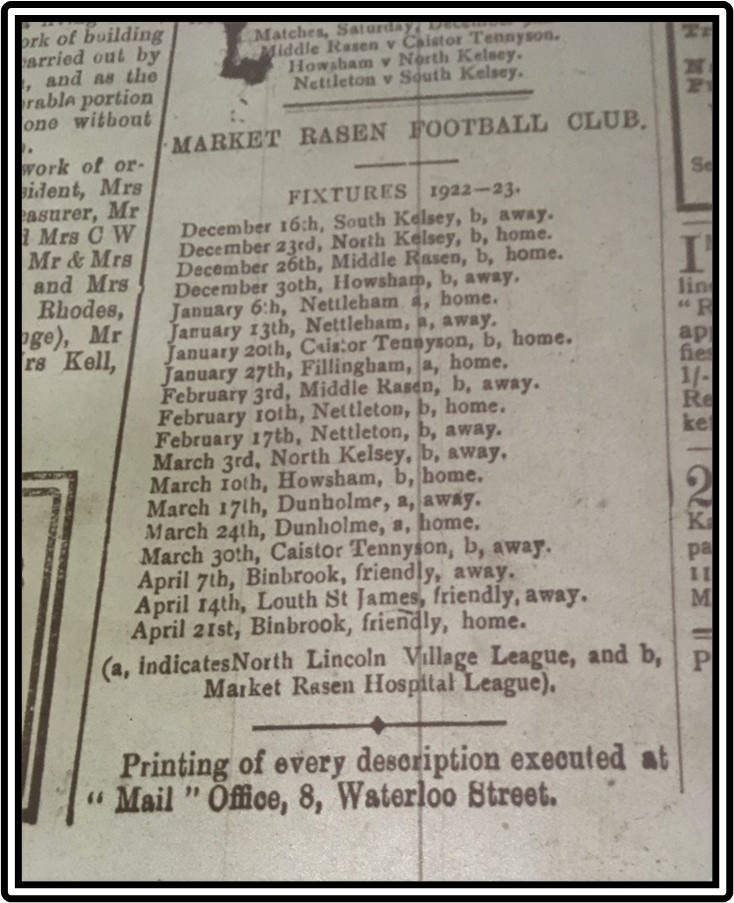
A newspaper clipping listing the Market Rasen Football Club fixtures from 1922-23. Image credit: Author’s collection
28th April
Market Rasen Hospital Football League Champions for 1922/23 were Market Rasen Town FC. They hosted a Charity match at De Aston School, against a team representative of the rest of the League. The Champion won 5-0. At the close of the match, prizes were presented to the handsome cup and medals to the winners and a silver shield to the runners-up (North Kelsey). In addition to the team playing, three other Rasen players who had taken part in League matches received medals- W Priestley, A.T. Padley and H Bevans. I did not go to the evening “smoker” which was held at the Railway Hotel.
May
All changed in May as Mr J W Watson sold the licencing rights to The Globe Picture Theatre Company of Grimsby. I was offered a job with the London & North Eastern Railway and left Market Rasen. When I returned in 1929, the cinema was called Town Cinema under new management.
Thinking back, Market Rasen was a great place to live, with all the clubs etc; I just did not appreciate it. But there were social and medical problems, which the adults had to address every month at the Urban District Council meetings. The Medical Officer reported on the health and welfare of the town- overcrowding and poor housing, lack of clean water, poor hygiene of milk supplies, the three slaughterhouses needed to be upgraded as did the sewage system. The high cases of Diphtheria, Scarlet Fever and TB. I still remember the hours I spent escaping my everyday life in the wonders of the world and Charlie Chaplin.
[BELL RINGS…]
Back to work. Oh yes. I saw Percy last year in Worksop; he is a Railway Shunter.
Acknowledgements:
Market Rasen Rases by Jean Lucas
Let’s go to the Pictures by Tony Trevor
Kelly’s Directory 1922
Rase Heritage Society
Market Rasen Library- Market Rasen Mail 1922 and 1923; British Newspaper Archives; Ancestry.co.uk.
